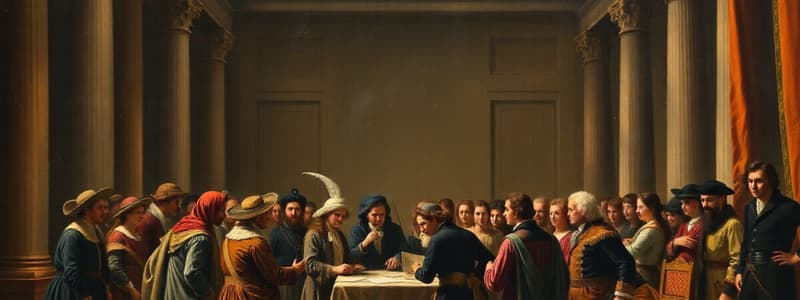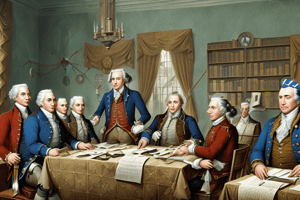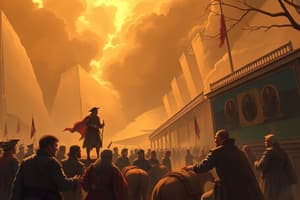Podcast
Questions and Answers
What was one major limitation of the Articles of Confederation regarding the federal government's power?
What was one major limitation of the Articles of Confederation regarding the federal government's power?
- The government could not raise an army or navy.
- The government could tax and regulate commerce.
- The government could not conduct foreign relations.
- The government did not have an executive branch to enforce laws. (correct)
Which plan proposed at the Constitutional Convention favored larger states by allocating representation based on population?
Which plan proposed at the Constitutional Convention favored larger states by allocating representation based on population?
- The Virginia Plan (correct)
- The New Jersey Plan
- The Great Compromise
- The Federalist Plan
What was the outcome of the Three-Fifths Compromise?
What was the outcome of the Three-Fifths Compromise?
- Some states could choose not to count slaves at all.
- The compromise abolished slavery in the southern states.
- Slaves were counted as a full person in state populations.
- Every five enslaved persons were counted as three persons for representation and taxation. (correct)
Which statement best describes the government structure under the Articles of Confederation?
Which statement best describes the government structure under the Articles of Confederation?
What compromise was proposed to ensure both large and small states had fair representation in Congress?
What compromise was proposed to ensure both large and small states had fair representation in Congress?
Flashcards
Articles of Confederation
Articles of Confederation
The first constitution of the United States, which established a weak national government with limited powers, giving most power to the individual states.
Weaknesses of the Articles of Confederation
Weaknesses of the Articles of Confederation
The Articles of Confederation lacked key powers, such as the ability to tax, regulate commerce, or enforce laws effectively, leading to economic and political instability.
Constitutional Convention
Constitutional Convention
A meeting of delegates from 12 states in Philadelphia in 1787 to address the weaknesses of the Articles of Confederation and create a new government.
The Great Compromise
The Great Compromise
Signup and view all the flashcards
The 3/5's Compromise
The 3/5's Compromise
Signup and view all the flashcards
Study Notes
Articles of Confederation
- First plan of government for the United States
- Created a single branch of government (Congress)
- Congress handled foreign affairs
- States retained significant power
- Failed to effectively address important issues like interstate cooperation, defense, and finances
Powers of the Articles of Confederation
- Conduct foreign relations
- Raise an army and navy
- Borrow money
- Establish a postal system
- Manage Native American affairs
Powers Denied the Federal Government under the Articles
- No executive branch to enforce laws
- No power to regulate commerce
- No power to tax
Constitutional Convention
- Twelve states sent delegates to Philadelphia in 1787
- Rhode Island did not participate due to concerns about repayment of war debts
- Delegates lacked a clear plan for new government
The New Jersey Plan
- Proposed by William Paterson
- Three branches of government
- Single-house legislature
- Each state held one vote, regardless of population
The Great Compromise
- Proposed by Roger Sherman
- Two-house legislature (bicameral)
- Lower house (House of Representatives): representation based on population
- Upper house (Senate): each state gets two senators
The 3/5's Compromise
- Southern states wanted to include enslaved people in population counts for representation
- Enslaved persons counted as 3/5 of a free person for both taxation and representation
Studying That Suits You
Use AI to generate personalized quizzes and flashcards to suit your learning preferences.
Description
This quiz covers the key aspects of the Articles of Confederation, including its powers and limitations, as well as the events of the Constitutional Convention. Understand the challenges faced by the early United States government and the proposals that emerged from the convention, such as the New Jersey Plan. Test your knowledge of this critical period in American history.




